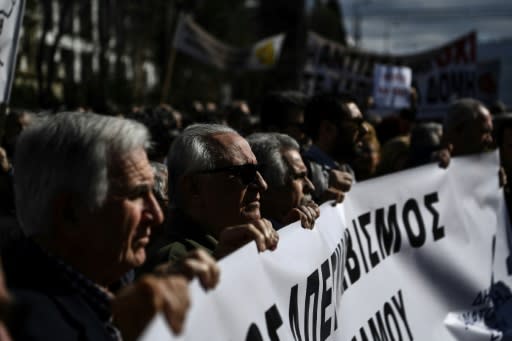Greek islanders take anti-camp protest to Athens
Greek officials and residents from islands hosting thousands of asylum-seekers staged a protest in Athens on Thursday against plans to build new camps. Dozens of demonstrators from the Aegean islands of Lesbos, Chios and Samos gathered outside the interior ministry, brandishing banners against the camps project. The new conservative government which came to power in July has announced that the present camps, which are stretched several times beyond capacity, are to shut down this year. They are to be replaced with new, smaller facilities that are to be operational by mid-2020. But authorities and residents on the five Aegean islands with camp facilities, which include Leros and Kos, have opposed the initiative. The islanders demand the immediate removal of most of the asylum-seekers and accuse the EU of abandoning them. Some banners called for "illegal migrants" to be expelled and for the country's borders to be closed. But some demonstrators chased off former deputies and senior figures in the neo-Nazi Golden Dawn party after they joined the protest, an AFP journalist witnessed. "If we accept a (new) camp for 7,000 people, unofficially it could be 20-25,000 people," said Georgios Stantzos, the mayor of eastern Samos. The ongoing deadlock, five years after the height of the migration crisis, has caused exasperation among both island residents and asylum-seekers. Outbreaks of violence are frequent in the overcrowded camps, and last week seven people on Lesbos were arrested on suspicion of forming a vigilante group to attack migrants. "The announcement by the government to create new camps and set new procedures is welcomed, as we all want to get rid of a situation that is totally disastrous for the persons who are living today and for months in overcrowded conditions," Philippe Leclerc, the UNHCR's representative in Greece, told AFP. "The situation in the islands is dramatic," he said. What had to be done in the coming weeks was to transfer as many asylum-seekers as possible to the mainland, Leclerc added. After weeks of talks with local officials, the government this week caused further anger by announcing that land could be requisitioned for a three-year period to build the new facilities. "Talks cannot continue indefinitely... The time for decisions has come," government spokesman Stelios Petsas told state TV ERT on Wednesday, adding that landowners would be compensated. But northern Aegean regional governor Constantinos Moutzouris told Alpha TV at the protest: "We are ready to do everything to find peaceful solutions, provided the government abandons these (requisition) methods." The government has said the new camps will be designed to accommodate 20,000 asylum-seekers for a maximum of three months at a time. The camps on the five islands to be shut down currently house more than 38,000 even though they have an official capacity of 6,200. The people there live in dire conditions repeatedly condemned by rights groups and the Council of Europe. Rights activists and opposition parties have also criticised plans to make the new camps closed facilities, restricting the freedom of movement that asylum-seekers currently enjoy on the islands. Dozens of demonstrators from the Aegean islands of Lesbos, Chios and Samos gathered outside the interior ministry in Athens on February 13, brandishing banners against the camps project A woman holds a Greek flag and a placard reading "Close the borders, Deport the illegal migrants" during a demonstration in Athens on February 13 against the government's plans to build new migrant camps Islanders who protested in Athens on February 13 demanded the immediate removal of most of the asylum-seekers and accused the EU of abandoning them




